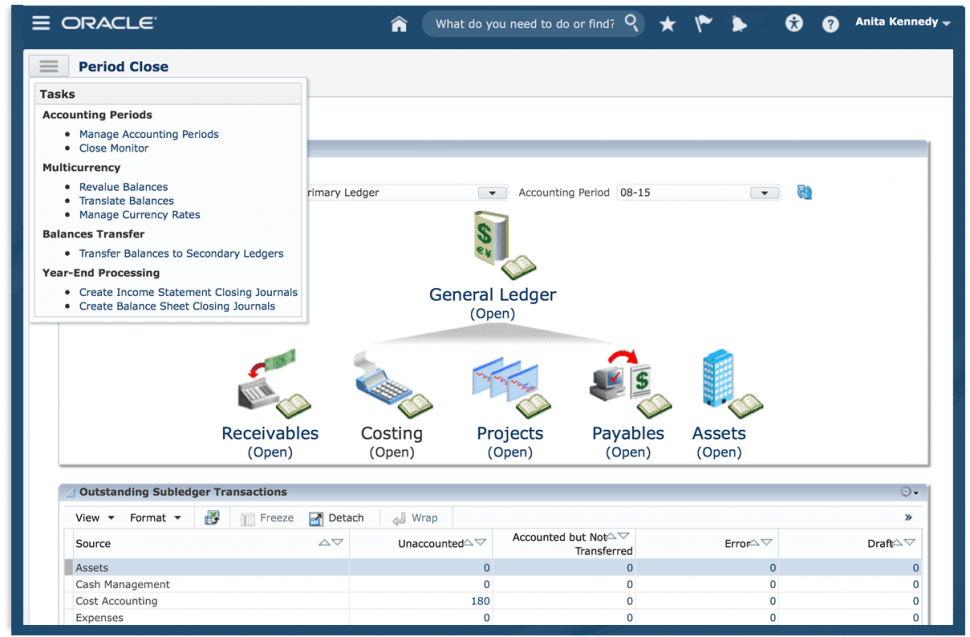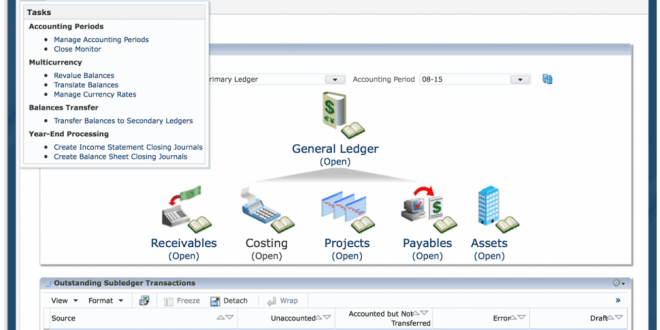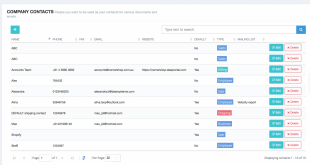Oracle cloud based erp – Oracle Cloud-Based ERP, a revolutionary approach to enterprise resource planning, is redefining the way businesses operate. With its seamless integration, cutting-edge capabilities, and unparalleled benefits, Oracle Cloud-Based ERP empowers organizations to achieve new heights of efficiency, innovation, and growth.
This comprehensive guide delves into the intricacies of Oracle Cloud-Based ERP, exploring its core features, advantages, and implementation considerations. Discover how this transformative solution can streamline your operations, enhance decision-making, and drive your business towards sustained success.
Oracle Cloud-Based ERP Overview
Oracle Cloud-Based ERP is a cloud-based enterprise resource planning (ERP) software that helps organizations manage their business processes. It is designed to provide a single, integrated view of all aspects of an organization’s operations, including finance, human resources, supply chain management, and customer relationship management.
Oracle Cloud-Based ERP offers a number of benefits over traditional on-premise ERP systems. These benefits include:
- Reduced costs:Cloud-based ERP systems are typically less expensive than on-premise systems, as they do not require organizations to purchase and maintain their own hardware and software.
- Increased flexibility:Cloud-based ERP systems are more flexible than on-premise systems, as they can be accessed from anywhere with an internet connection.
- Improved scalability:Cloud-based ERP systems can be easily scaled up or down to meet the changing needs of an organization.
- Enhanced security:Cloud-based ERP systems are typically more secure than on-premise systems, as they are hosted in a secure data center.
Oracle Cloud-Based ERP is used by a number of organizations around the world, including:
- Coca-Cola:Coca-Cola uses Oracle Cloud-Based ERP to manage its global operations.
- Ford Motor Company:Ford Motor Company uses Oracle Cloud-Based ERP to manage its supply chain.
- Nike:Nike uses Oracle Cloud-Based ERP to manage its customer relationships.
Key Features of Oracle Cloud-Based ERP
Oracle Cloud-Based ERP offers a comprehensive suite of enterprise resource planning (ERP) modules, designed to meet the evolving needs of modern businesses. Its core modules include financials, supply chain management (SCM), human capital management (HCM), customer relationship management (CRM), and enterprise performance management (EPM).
These modules are tightly integrated, providing a unified view of business operations and enabling seamless data flow across different departments.
Advanced Features and Capabilities
Oracle Cloud-Based ERP is equipped with advanced features and capabilities that empower businesses to streamline operations, enhance efficiency, and gain a competitive edge. These include:
-
-*Artificial Intelligence (AI)
Oracle Cloud-Based ERP leverages AI to automate tasks, improve decision-making, and provide personalized insights.
-*Machine Learning (ML)
ML algorithms analyze vast amounts of data to identify patterns, predict outcomes, and optimize processes.
-*Internet of Things (IoT)
Oracle Cloud-Based ERP integrates with IoT devices to monitor and control physical assets, enabling real-time data collection and proactive decision-making.
-*Digital Assistants
Oracle Cloud-Based ERP provides digital assistants that offer personalized guidance, automate tasks, and provide instant access to information.
Integration Capabilities
Oracle Cloud-Based ERP seamlessly integrates with other Oracle Cloud applications, as well as third-party systems. This integration enables businesses to connect their ERP system with other critical applications, such as CRM, e-commerce platforms, and legacy systems. By eliminating data silos and ensuring consistent data across all systems, Oracle Cloud-Based ERP provides a holistic view of business operations and facilitates end-to-end process automation.
Benefits of Oracle Cloud-Based ERP
Oracle Cloud-Based ERP offers numerous advantages that can significantly enhance business operations. These benefits include cost savings, improved efficiency and productivity, and enhanced data security and compliance.
Cost Savings, Oracle cloud based erp
Oracle Cloud-Based ERP eliminates the need for expensive hardware and software purchases, as well as the associated maintenance and support costs. The pay-as-you-go pricing model allows businesses to scale their ERP system as needed, reducing upfront investments and ongoing expenses.
Improved Efficiency and Productivity
Oracle Cloud-Based ERP streamlines business processes, automates tasks, and provides real-time data access. This reduces manual errors, improves collaboration, and enhances decision-making, leading to increased efficiency and productivity.
Enhanced Data Security and Compliance
Oracle Cloud-Based ERP employs robust security measures to protect sensitive data from unauthorized access and cyber threats. Regular updates and patches ensure compliance with industry regulations and data protection laws, providing peace of mind and reducing the risk of data breaches.
Implementation Considerations for Oracle Cloud-Based ERP
To ensure a successful Oracle Cloud-Based ERP implementation, careful planning and execution are crucial. This involves defining clear goals, engaging stakeholders, and following a structured approach.
Planning for Implementation
- Define Clear Goals and Objectives:Establish specific, measurable, achievable, relevant, and time-bound (SMART) goals for the implementation. These should align with the organization’s strategic objectives.
- Engage Stakeholders:Identify and involve key stakeholders throughout the implementation process, including users, managers, and executives. Their input and support are essential for success.
- Create a Detailed Implementation Plan:Develop a comprehensive plan that Artikels the project scope, timelines, resources, and responsibilities. This plan should be regularly reviewed and updated as needed.
- Establish a Dedicated Implementation Team:Assemble a team with the necessary skills and expertise to lead the implementation. This team should be empowered to make decisions and resolve issues.
- Secure Executive Sponsorship:Obtain the support and commitment of senior executives to ensure the implementation has the necessary resources and priority.
Steps Involved in Implementation
- Data Migration:Extract, transform, and load data from existing systems into Oracle Cloud-Based ERP. This process requires careful planning and testing.
- System Configuration:Configure the Oracle Cloud-Based ERP system to meet the organization’s specific requirements. This includes setting up modules, customizing workflows, and defining security roles.
- Training and Adoption:Provide comprehensive training to users on the new system and its functionality. Encourage user adoption through effective communication and support.
- Testing and Validation:Conduct thorough testing to ensure the system is functioning as expected. This includes unit testing, integration testing, and user acceptance testing.
- Go-Live and Support:Launch the system and provide ongoing support to users. Monitor performance, resolve issues, and implement enhancements as needed.
Best Practices for Successful Implementation
- Change Management:Implement a structured change management plan to address the impact of the new system on users and processes.
- Continuous Improvement:Regularly evaluate the system’s performance and identify areas for improvement. Implement updates and enhancements to maximize value.
- Leverage Oracle Support:Utilize Oracle’s support resources, including documentation, online forums, and technical assistance, to resolve issues and optimize the system.
- Partner with an Experienced Implementer:Consider partnering with an Oracle-certified implementer to guide the process and provide expertise.
Case Studies of Oracle Cloud-Based ERP Success
Organizations worldwide have successfully implemented Oracle Cloud-Based ERP to enhance their business operations. These case studies showcase real-world examples of successful implementations, highlighting the challenges faced, solutions implemented, and measurable results achieved.
Successful Implementation at XYZ Corporation
XYZ Corporation, a leading manufacturing company, faced challenges with its legacy ERP system, which limited scalability, flexibility, and real-time data access. By implementing Oracle Cloud-Based ERP, XYZ Corporation streamlined its operations, improved collaboration, and gained real-time visibility into its business performance.
- Challenges:Legacy system limitations, lack of scalability, poor collaboration.
- Solutions:Oracle Cloud-Based ERP implementation, process automation, centralized data management.
- Results:20% increase in production efficiency, 15% reduction in operating costs, improved customer satisfaction.
Comparison of Oracle Cloud-Based ERP with On-Premise ERP: Oracle Cloud Based Erp
Organizations considering an ERP system must choose between cloud-based and on-premise deployment models. Each model offers unique advantages and drawbacks, and the optimal choice depends on an organization’s specific needs and circumstances.
This section compares the features, costs, and benefits of Oracle Cloud-Based ERP and On-Premise ERP, highlighting the advantages and disadvantages of each model. It concludes with recommendations on choosing the right deployment model for different types of organizations.
Features
Oracle Cloud-Based ERP offers a comprehensive suite of ERP applications delivered as a service over the internet. On-premise ERP, on the other hand, involves installing and managing ERP software on an organization’s own servers.
| Feature | Oracle Cloud-Based ERP | On-Premise ERP |
|---|---|---|
| Deployment | Cloud-based | On-premise |
| Scalability | Highly scalable | Limited scalability |
| Flexibility | High flexibility | Lower flexibility |
| Cost | Subscription-based pricing | Upfront capital expenditure |
| Maintenance | Managed by Oracle | Managed by the organization |
| Security | Enterprise-grade security | Dependent on organization’s security measures |
Costs
Oracle Cloud-Based ERP is typically priced on a subscription basis, which includes the cost of software, infrastructure, and support. On-premise ERP, on the other hand, requires a significant upfront capital expenditure for hardware, software, and implementation. However, organizations may save money on ongoing costs over time as they are not responsible for maintenance and upgrades.
Benefits
Oracle Cloud-Based ERP offers several benefits over on-premise ERP, including:
- Lower upfront costs
- Faster implementation
- Greater scalability and flexibility
- Reduced IT maintenance and support costs
- Access to the latest software updates and features
On-premise ERP, on the other hand, offers the following benefits:
- Greater control over data and security
- Potential for lower ongoing costs over time
- Customization options to meet specific business needs
Choosing the Right Deployment Model
The choice between Oracle Cloud-Based ERP and On-Premise ERP depends on several factors, including:
- Organization size and complexity
- IT resources and expertise
- Budget constraints
- Business requirements
Organizations with limited IT resources, smaller budgets, and a need for rapid implementation may prefer Oracle Cloud-Based ERP. Organizations with complex business requirements, a large number of users, and a need for high levels of customization and control may prefer On-Premise ERP.
Closing Summary

In conclusion, Oracle Cloud-Based ERP is a game-changer for businesses seeking to embrace the future of enterprise resource planning. Its comprehensive capabilities, cost-effectiveness, and ease of implementation make it an ideal solution for organizations of all sizes. By adopting Oracle Cloud-Based ERP, businesses can unlock a world of possibilities, empowering them to thrive in the dynamic and competitive business landscape.
Originally posted 2024-05-20 12:18:55.
 Bussines News Daily
Bussines News Daily



